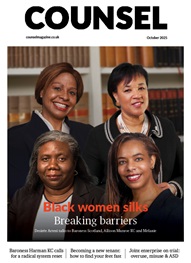*/
In a country where “law is a bedrock of society” the new Supreme Court is a “pillar of the constitution”, the former senior Law Lord, Lord Bingham of Cornhill told a well attended meeting of the All Party Parliamentary Group for Legal and Constitutional Aff airs on 26
October. His comments were made in response to a suggestion—for which he had no sympathy— that the justices could save the salary of a Chief Executive by sharing the administrative and human resources duties amongst themselves. During the meeting he also stated his opposition to televising court proceedings—the tendency would be to broadcast things out of context and “I don’t think [televising has] much enhanced the standing of Parliament”. Although the role of the President of the Supreme Court will evolve he did not foresee a change in the way the justices dealt with the law (judicial “activism” or the lack of it was cyclical and a function of personalities) but there will be a change in perception which will be for the better.
He endorsed the selection process for justices brought in by the Constitutional Reform Act 2005 as being “as near politicsproof as it could be”. Although the Lord Chancellor retains the power to reject a candidate, it was “fanciful” that the selection panel would put up someone who is unfi t. The questions followed a speech in which he outlined the history of the highest court in the land since the Tudors accepted that final judicial decisions should be in the House of Lords sitting in an appellate capacity. Th at function narrowly escaped abolition in 1868 only due to a change in the governing party. It more recent years it evolved into the House of Lords we knew—twelve apolitical judges who played very little part in the legislature. Nevertheless, institutions “should look like what they are”. The Palace of Westminster is a parliament, not a court. One benefi t of the new premises is that the allocation of their rooms is no longer within the sole gift of the Party whips.
He endorsed the selection process for justices brought in by the Constitutional Reform Act 2005 as being “as near politicsproof as it could be”. Although the Lord Chancellor retains the power to reject a candidate, it was “fanciful” that the selection panel would put up someone who is unfi t. The questions followed a speech in which he outlined the history of the highest court in the land since the Tudors accepted that final judicial decisions should be in the House of Lords sitting in an appellate capacity. Th at function narrowly escaped abolition in 1868 only due to a change in the governing party. It more recent years it evolved into the House of Lords we knew—twelve apolitical judges who played very little part in the legislature. Nevertheless, institutions “should look like what they are”. The Palace of Westminster is a parliament, not a court. One benefi t of the new premises is that the allocation of their rooms is no longer within the sole gift of the Party whips.
In a country where “law is a bedrock of society” the new Supreme Court is a “pillar of the constitution”, the former senior Law Lord, Lord Bingham of Cornhill told a well attended meeting of the All Party Parliamentary Group for Legal and Constitutional Aff airs on 26
October. His comments were made in response to a suggestion—for which he had no sympathy— that the justices could save the salary of a Chief Executive by sharing the administrative and human resources duties amongst themselves. During the meeting he also stated his opposition to televising court proceedings—the tendency would be to broadcast things out of context and “I don’t think [televising has] much enhanced the standing of Parliament”. Although the role of the President of the Supreme Court will evolve he did not foresee a change in the way the justices dealt with the law (judicial “activism” or the lack of it was cyclical and a function of personalities) but there will be a change in perception which will be for the better.


Justice system requires urgent attention and next steps on the Harman Review
Q&A with Tim Lynch of Jordan Lynch Private Finance
By Marie Law, Director of Toxicology at AlphaBiolabs
By Louise Crush of Westgate Wealth Management
Why Virtual Assistants Can Meet the Legal Profession’s Exacting Standards
Despite increased awareness, why are AI hallucinations continuing to infiltrate court cases at an alarming rate? Matthew Lee investigates
Many disabled barristers face entrenched obstacles to KC appointment – both procedural and systemic, writes Diego F Soto-Miranda
The proscribing of Palestine Action under the Terrorism Act is an assault on the English language and on civil liberties, argues Paul Harris SC, founder of the Bar Human Rights Committee
For over three decades, the Bar Mock Trial Competition has boosted the skills, knowledge and confidence of tens of thousands of state school students – as sixth-form teacher Conor Duffy and Young Citizens’ Akasa Pradhan report
Suzie Miller’s latest play puts the legal system centre stage once more. Will it galvanise change? asks Rehna Azim